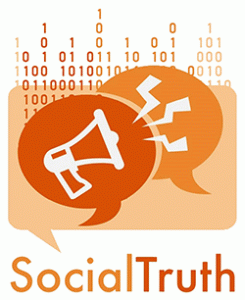 Following the increasing appearance of news related to coronavirus, the SocialTruth consortium initiated on February 4th 2020 a new thread of interlinked activities to address this topic, within the scope of the action. We considered it an important case study, given the many indications for misinformation and fake information circulated on this subject (https://www.theguardian.com/world/2020/jan/31/bat-soup-dodgy-cures-and-diseasology-the-spread-of-coronavirus-bunkum).
Following the increasing appearance of news related to coronavirus, the SocialTruth consortium initiated on February 4th 2020 a new thread of interlinked activities to address this topic, within the scope of the action. We considered it an important case study, given the many indications for misinformation and fake information circulated on this subject (https://www.theguardian.com/world/2020/jan/31/bat-soup-dodgy-cures-and-diseasology-the-spread-of-coronavirus-bunkum).
The SocialTruth consortium has agreed on the following plans to be carried out, with each partner undertaking specific role and activities:
- Partner QWANT (FR) – an independent European Search Engine vendor – will be aggregating large volumes of datasets enriched with metadata that will be useful to assess credibility levels. Our plan is, first, to make available Coronavirus-related Tweets and News Feeds to be used by SocialTruth partners for misinformation analysis and for preparing and validating computer algorithms for identifying fake news. Furthermore, these training and validation datasets can also be made available to EU researchers and R&D projects via the SOMA CSA. The option to deploy datasets from SocialTruth via SOMA has been discussed earlier during the plenary cluster discussions.
- As a Media Group, Partner ADNKRONOS (IT) will contribute to the dissemination of verified news and information on Coronavirus. Adnkronos has developed an RSS feed on Coronavirus-related news and it is available free of charge here: https://www.adnkronos.com/RSS_Coronavirus.xml
The partner informed that: “Adnkronos have been working for years daily, to ensure the quality of the news in such a delicate area as the health and well-being of people. So, in a time of difficulty for the whole country, institutions, businesses and citizens, we have considered the dissemination of qualified information on the current emergency of fundamental importance, through an operation aimed at the maximum diffusion of the most relevant news for the readers“. - Misinformation based on content taken out-of-context: As partners TECOMS (IT) and LSBU (UK) have pointed out, one of the biggest problems (that occured especially during the beginning of this crisis) is the spread of photos allegedly coming from China and showing sick people in the streets (later proved to be photos from other times and/or locations). For this reason, a priority would be to build a verification service able to designate those inconsistencies, for example by detecting if part of the content (such as the photos) inside a news article has already been on the internet for some time and with metadata referable to other contexts.”
- Accelerate the development – by QWANT (FR) and ICCS (GR) – of the Digital Companion, designed as a browser plugin for checking fake news, and prepare a short video to present it. As consumer organization, INFOCONS (RO) can in turn use the Digital Companion demonstration, together with information about food waste, to correctly and responsibly inform citizens about the effects of fake news related to Covid-19.
Accelerate the publication of a questionnaire to study citizens’ behaviour towards false data, posting it on the project website (in English language). As extensively discussed within the consortium, and as highlighted by InfoCons (RO), misinformation on Coronavirus already causes economic harm to the European citizen. For example, due to the economic speculation, the Romanian Government has been forced to regulate, for a period of 3 to 6 months, the price of all medical protective equipment and materials against Covid-19 that are sold to the population.
In parallel to the false news about the effect of coronavirus, false news about the imminent crisis regarding food and sanitary materials are spreading. These are expected to produce economic consequences on the European citizen, due to the:
- unjustified increase in food supplies at household level,
- unjustified increase in supplies of sanitary materials at household level.
ICCS, as Coordinators of the SocialTruth action, is considering the case of Coronavirus misinformation as an opportunity to further strengthen and promote content verification research, encouraging the use of our collected datasets by EU research organizations to train new Machine Learning algorithms and systems in an effort to battle misinformation. It is also an opportunity to bring EU research activities and different verification services closer together – SocialTruth’s inherently decentralized architecture can serve as the glue and enabler to unlock such synergies at European scale.
We also remain open to any additional ideas on how our Action can best support the EU political agenda and policies regarding online misinformation.

